She was posted to Shanghai, China for a work assignment in January this year.
The different work environment there definitely provided a culture shock for Chew Jia Zhen, 25, and she had to get used to it quickly. But now she calls Shanghai her home and is enjoying her first overseas work stint.
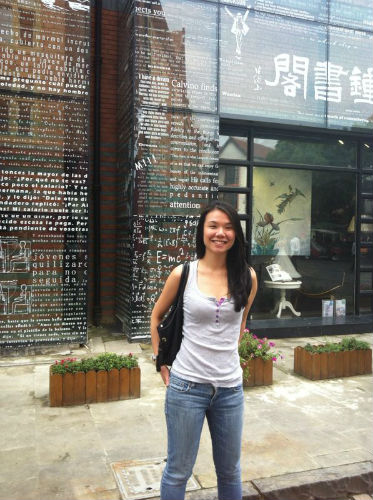
Chew Jia Zhen outside a popular Chinese bookshop in Thames Town Shanghai. (Picture courtesy of Jia Zhen)
I recently interviewed this jet-setting regional product development manager to find out what the job market and the working conditions are like in China. The challenges of working there and some tips on how to survive in China were also gleaned from Jia Zhen.
To find out what this young high flyer said, do read on.
Jia Zhen, what is the job market like for Singaporeans and Malaysians in China?
I see quite a few Singaporeans and Malaysians working in China, most of whom were formerly based elsewhere and posted to the companies’ China operations. But I’ve not really met Singaporean/Malaysian expats who went to China just to seek a job. Those I know are from Europe such as Germans who came to Shanghai on a tourist visa, decided to stay on and then got a job in Chinese companies.
Getting an alien employment visa is quite a hassle in China with multiple processes that take months. I guess this may be the reason why most people I’ve met have their postings sponsored by their companies.
What is the pay and promotional aspects like for Singaporeans and Malaysians working there?
I can say China is such a huge production and consumption market that many companies believe it is worth investing in – for the mid to long term. At the same time, China is a very tough market to compete in. It is a huge pie, but a complex Red Sea at the same time. So top management will pay a lot of attention to results and progress. Therefore, they are likely to employ high-profile employees who will have very positive promotional prospects if results are delivered.
However, the high profile can also be a double-edged sword against the backdrop of high management expectations, especially when the Chinese market is so different and complex, and there are so many layers of bureaucracy behind everything. Nevertheless, having the opportunities to figure out this highly tiered market, working in the local business environment, thinking creatively to overcome the endless challenges and gaining firsthand experience in working out emerging market strategies that succeed, provide very good career prospects.
Is it easy to work with the locals there?
Well, it’s a different work culture there. The key is don’t bring your perception of Singapore and expect things to be the same in Shanghai because it’s different. The trick is to understand how they work. It’s very community based so nobody makes individual decisions. The Chinese like to involve more people and have more stakeholders present. It is community based. But that is not a bad thing because it engages stakeholders making decisions.
They like long meetings and most managers spend seven to eight hours a day on meetings to discuss something rather than coming up with a recommendation – through doing homework before that.
Also, usually in Singapore, we go by the scientific approach. We do research and have good justification before we put a decision through but the local management in China is different, probably because the nature of competition is different. Things move a lot faster and competitors move faster so a lot of times, it’s trial-and-error and making decisions without spending too much effort at all doing the research and figuring out the justification. So the trick is to understand how they work. But it does not mean you have to adapt 100% though.
So how do you adapt to working in China?
There are certain principles I believe in. For example, you do your market research and get recommendations but you discuss them with the team first. This helps to shorten the meeting time to say, half an hour. When I first moved there, it was seven to eight hours of meetings a day, which really frustrated me, because I have a lot other work to. But you have to adapt to it.
At the same time though, there are certain areas that you can’t comprise in. But you can actually make everyone’s life better. Not everyone likes to be in meetings all day because they have work to do as well. So it has to be a win-win situation. Basically, it is about being flexible. Don’t impose your perception of what Singapore is like in China. Just play it by ear as you work there.
While adapting is one thing, you could also identify some principles that you think you can bring from Singapore such as doing some homework and research and working out an agenda before a meeting. This will definitely make things more efficient. You could help to improve the way things work in the company.
There are certain work cultures that you can bring from Singapore to China that bring out efficiency and make it a win-win for all. Adapt and apply them.
Also have an authority such as the top management backing you up because things will move a lot faster. What they say is important. You need to work with her and cooperate with her. Without this, things won’t move so it helps to make things easier.
But whatever you do, engaging and communicating with the stakeholders is important.
How easy is it for Singaporeans and Malaysians to adapt to the living and working conditions in China?
It’s definitely a challenge. I think nothing is easy when you are moving from Singapore. Even though we are still in Asia, China is very different to Singapore. There’s a language barrier for a start. Even if you speak Mandarin, their Mandarin is very different.
There is also a lot of physical pushing and shoving there in public, which is common in a more crowded city so that it is not easy but the key thing is to go there with an open mind.
The important thing is that you must adapt to life there. Once you impose certain cultural and practices from Singapore, it will only make life harder and more difficult.

Love letters from a matchmaking session taking place at Shanghai’s People’s Park. (Picture courtesy of Jia Zhen).
What is the biggest challenge of living in China compared to Singapore?
Figuring out how things work in China is quite complex. For example, if you are trying to get a bankcard, you may go to five banks and be told that you can’t do it because you are a foreigner. Finally you realise that only the Bank of China opens bank accounts for foreigners and when you get there, it is a three-hour process.
So I think at the end of the day, the hardest part was when I had to figure out how things work and how the train system works. But once you have become familiar with things there, it just gets a lot easier. I didn’t even know how to pay bills in the first few months. When I spoke to people, they just say to pay online, but I’m not a Chinese citizen so I can’t just open an account online. So it took me three months before I got used to it.
What are the most enjoyable aspects of living and working in Shanghai?
It’s a huge city much bigger than Singapore and it’s very Chinese but is also very international at the same time. Beijing can’t even compare – even though it’s the capital. When I feel homesick, I can easily find Singapore food, go to expat places and meet different people.
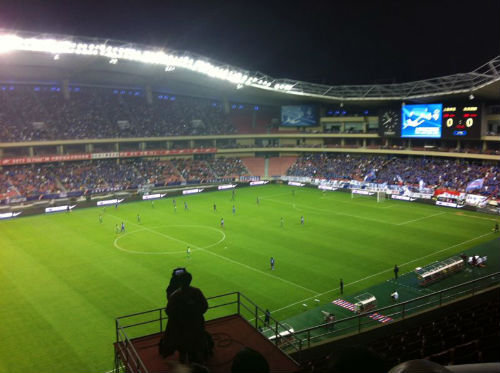
Shanghai Hongkou Stadium, where Jia Zhen catches live football matches. (Picture courtesy of Jia Zhen).
At the same time, if you go to the local parks, which are awesome, you can just see what the locals are doing too – writing calligraphy on the floor in the park, singing traditional folk songs in opera style and dancing away. You get to see more things too. China has a lot of concert halls and historical sites. Shanghai gives me the space to explore and is very accessible to a lot of other cities in China. So if you want to go to Wuzhi, Nanjing, Fuzhou, Hangzhou, which are all very scenic tourist spots, you can just take a train and it is a very scenic and comfortable hour ride.
One enjoyable aspect of working in China is that when you get some work progress, it is really enjoyable and is worth the pain. I feel that this is what I work hard to achieve during the day.
China is an emerging market but very complex. So when you gradually figure something out and get results, then the process is very enjoyable.
What are the general living expenses like in Shanghai?
In terms of food, it is on par with Singapore. The restaurants are in the high SGD20. If you go to the supermarket, vegetables are more expensive than Singapore. I would say a packet of green leafy veggies cost SGD1 but in China it costs SGD2 even though we import a lot of veggies from China. It may be supply and demand at work. The imported goods though, are usually very expensive. A pack of cheese here costs SGD3 but in Shanghai it costs SGD6.
A litre of milk, for a local brand is SGD3 but a litre of Magnolia here is less than that in Singapore. Usually I try to drink foreign brands after the melamine scandal. And a litre of UHT milk from Australia costs SGD5 per litre. For me, living alone is affordable as I am just one person and a litre of milk still lasts me some time. But generally you would think China is cheap but Shanghai is not cheap at all. But it is manageable for me because I am living alone and on a pay that is higher than the locals.
I usually take the train to get around and that is where it becomes really affordable in Shanghai. A train ride costs RMB3, which is about SGD0.60 for an adult but if you go longer distance it is only RMB6, which is only SGD1.20.
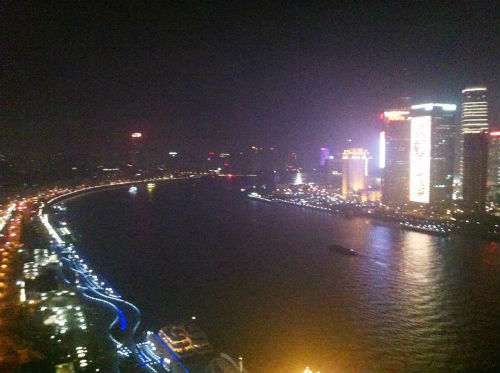
Night view of the famous Bund from Char Bar, the rooftop bar at Shanghai’s Hotel Indigo (Picture courtesy of Jia Zhen).
How much does it cost for rental of accommodation per month (for a couple) there?
Shanghai homes are quite expensive. I would say it is slightly more expensive than Singapore’s prices. In terms of rental, on a per-month basis, if you stay somewhere that is on the outer fringes, about 40 minutes from the city centre, (not considered the prime area), that costs about RMB 7,000 per month, which is about SGD1,400 per month for a two-bedroom apartment.
In the city centre, it can go as high as SGD3,000 and above for a one-bedroom apartment.
How easy is it for you to satisfy your Singaporean food cravings there?
It’s not too difficult. There are a lot of Singaporean food places. Usually I go to this chain stall called Fushion. They sell Singaporean and Malaysian food, which is quite authentic. I eat the carrot cake, which is my favourite food there, you can’t get the Singaporean taste but it is still not too bad.
There’s also Raffles City (not too far from the city centre) in Shanghai and it’s owned by Capitaland so you see a lot of Singaporean brands there. Toastbox is also there so I can get the Kopi-C or Teh-C. It tastes almost the same but nothing still beats the home taste though.
The taste of the local food is pretty good so I would say it is about 90 per cent comparable to the versions in Singapore.

Fuxing Park, the biggest park in Shanghai and the place where Jia Zhen does her morning jogs. (Picture courtesy of Jia Zhen).
How easy is it to make friends with the locals?
Well it’s not too difficult. The Chinese are very hospitable people and if you know them, they are friendly but if you don’t, they may be quite moody. They are also keen to learn about different cultures, at least for those whom I have met, and to practise their English. And I’m happy to practise my Chinese with them. So that’s a win-win situation.
Generally if the locals know you or have been introduced to you through someone else, they are usually really friendly.
Before I moved to Shanghai, I used to work closely with some counterparts in China so when I first moved there, they brought me around. My colleagues were also really friendly and took me around so it wasn’t too bad.
I have heard that the pollution levels in cities in China can get quite high. How does this affect your activities there, say in Shanghai?
Of all the cities, compared to Beijing, which I have been twice so far, Shanghai is so much better. The air is clear roughly 85% of the time. I don’t track the PSI levels though cause it’ll be miserable to track but usually the air is clear. Sometimes when there is pollution from North China or Beijing and it blows over to Shanghai, that is when the air becomes painfully smoggy but compared to other cities like Nanjing, Shanghai still has better air quality. It doesn’t really affect outdoor activities.
I have some local friends who discourage me from jogging outdoors and encourage me to jog in the gym but fingers crossed, I’m still ok and when I jog, its ok in the parks where there are a lot of trees but generally it’s still better than Beijing. Loads of people are still jogging, picnicking or cycling in the parks, like Fuzhin Park, which is one of the biggest parks in Shanghai City.
Any good tips for working and living in China?
The biggest tip is to go there with an open mind. That is very important. Once you impose Singapore culture onto another culture, you become miserable. So an open mind is really important. And take it easy.
Being in China is a definitely an eye-opening experience. To yield results, you need to be there not for a few months, but for a long-term stint. But most companies see China as a long-term investment because you don’t see results quickly so you need to be there for a long time. In fact, I think even one year is too short. Most expats are based there for six to seven years before they start returning. It is an exciting market with plenty of growth and full of learning opportunities and if you don’t go through the challenges of an emerging market, you won’t get the satisfaction when you succeed.
Also living in another culture andLiving and Working in Shanghai, China country, you must keep an open mind. Be flexible and creative but there can be certain principles that you may have that you shouldn’t give up. It is a win-win situation if you stick to your principles and have an open mind and you’ll be successful.

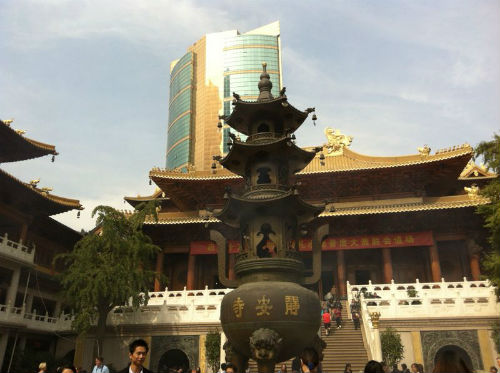
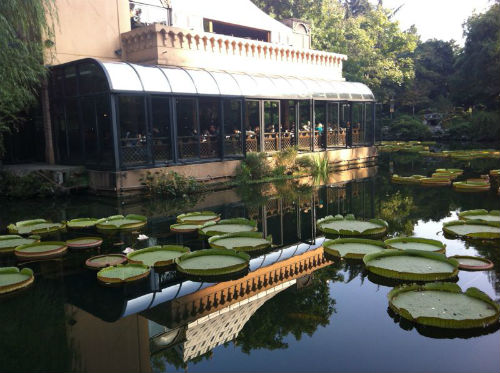
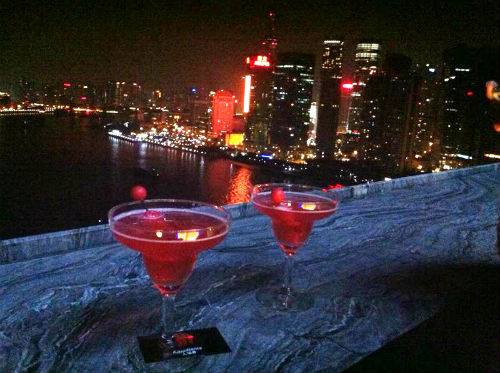
Leave a Comment